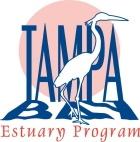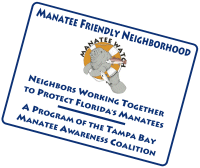 |
Our subscribe page has moved! Please visit baysoundings.com/subscribe to submit your subscription request. |
|||
Manatee Protection Efforts Move Ashore with Innovative New Program
The "Manatee-Friendly Neighborhood" program, created by the Tampa Bay Estuary Program's Manatee Awareness Coalition (MAC), honors communities that complete activities to educate their residents about manatees and the seagrass habitats they depend upon. "The more people learn, the more positive they feel about them," said Erica Moulton, chair of the MAC's Education Committee and an instructor at Hillsborough Community College. "And it's important to reach past waterfront homeowners because what happens in other neighborhoods makes a difference, too." To earn "Manatee-Friendly" status, a neighborhood must complete five activities, ranging from posting manatee caution signs on a percentage of neighborhood docks or conducting neighborhood monofilament line cleanups to supplying nearby boating businesses with boater's guides and other informational materials for distribution to their patrons. Although some of the activities are designed for waterfront neighborhoods, land-locked communities also are eligible and encouraged to participate. These neighborhoods may earn designation in a variety of ways: marking neighborhood storm drains with "no dumping" messages; publishing manatee protection tips in their association newsletter; or adopting a Tampa Bay manatee through Save The Manatee Club's Adopt-A-Manatee program, for example. Another important focus on the program is teaching residents what isn't good for manatees. "People tend to love wildlife to death," says Jessica Koelsch, a marine wildlife advocate at The Ocean Conservancy. "They're easy to attract with food and fresh water, but they may be attracted to places they shouldn't be." Manatees aren't able to distinguish between good humans and bad ones, adds Nancy Sandusky of Save the Manatee Club. "If you feed manatees from boats, you're encouraging them to swim up to boats expecting to be fed. Some people have been known to feed them non-food items, and fishermen may be irritated." Presentations have been made to about a dozen neighborhood associations that are working toward meeting the requirements, Moulton said. "We don't just pass out the signs - neighborhoods have to complete activities to earn them." Participating neighborhoods receive Neighborhood Notebooks filled with activities, resource lists, and samples of educational materials available at no charge. Additionally, interested neighborhoods will be assigned a MAC member to serve as their personal "community advisor" and help them implement their Neighborhood Manatee Watch activities. The program, which is open to any neighborhood in Hillsborough, Manatee or Pinellas counties, is the first in the state to work with homeowners associations, although Save the Manatee Club is working to expand the project across the state. "The MAC really deserves a lot of credit for their work," Sandusky said. To learn more about Neighborhood Manatee Watch, or to schedule a presentation, contact Nanette Holland, public outreach coordinator at the Tampa Bay Estuary Program, at (727) 893-2765 or e-mail nanette@tbep.org.
Revised Boater's Guide To Hillsborough Bay Now AvailableAn information-packed guide to environmentally responsible boating and angling in Hillsborough Bay is now available free of charge from the Tampa Bay Estuary Program. Originally produced by Concerned Citizens of Gibsonton and Audubon of Florida with a community grant from the Tampa Bay Estuary Program, the new Hillsborough Bay Boater's Guide shows additional information important to boaters - such as the new Manatee Protection Zone from the Alafia River south to E. G. Simmons Park in Ruskin. Also featured are such eco-landmarks as the Alafia Bank bird nesting colonies, ranked among the nation's largest and most diverse, and the Manatee Viewing Center at TECO's Big Bend facility - which hosts more than 200 manatees during the winter months. Important seagrass meadows, publicly owned lands and habitat restoration sites also are identified on the color map included in the guide, and accompanying text and photos showcase some of Hillsborough Bay's most intriguing inhabitants, including sharks and rays, sea turtles and diamondback terrapins, and a variety of spectacular wading and shorebirds. The guide informs boaters of areas where access is restricted to protect natural resources and wildlife. Additionally, it identifies major shipping channels, seagrass beds, manatee areas and shallow waters where boaters need to take special care. Printed on water-resistant paper, it is designed to be stored aboard a boat for handy reference. More than 15,000 copies of the original guide were distributed to area boaters directly and through bait shops, marinas, and other water-based businesses. The revised Hillsborough Bay Boater's Guide was made possible by contributions from the Tampa Bay Estuary Program, Cargill, Terrabrook, the Agency on Bay Management, and the Frank E. Duckwall Foundation. Residents may obtain their free Boater's Guide to Hillsborough Bay by calling the Tampa Bay Estuary Program at 727-893-2765 or e-mailing nanette@tbep,org.
Give A Day For The Bay on Jan.25
Work off all those holiday pounds while helping to improve the environment by participating in the Tampa Bay Estuary Program's next "Give A Day For The Bay" workday, set for Saturday, Jan. 25 at McKay Bay Nature Park in Tampa. The workday will run from 9 a.m.-1 p.m. Volunteers are needed to cut and cart limbs and branches of Brazilian peppers and other vegetation to re-establish a nature trail at the city park. Long sleeves, long pants, closed-toe shoes, and work or garden gloves strongly recommended. Lunch and cool t-shirts (a NEW design for 2003) will be provided to all volunteers. Partners include the City of Tampa Parks Department and Hillsborough County Resource Management. To sign up, e-mail nanette@tbep.org or call her at (727) 893-2765. |
||
 Manatees may live in the water, but their biggest threats come from land. Recognizing that challenge, an innovative new manatee protection program focuses on neighborhoods, both waterfront and land-locked.
Manatees may live in the water, but their biggest threats come from land. Recognizing that challenge, an innovative new manatee protection program focuses on neighborhoods, both waterfront and land-locked.